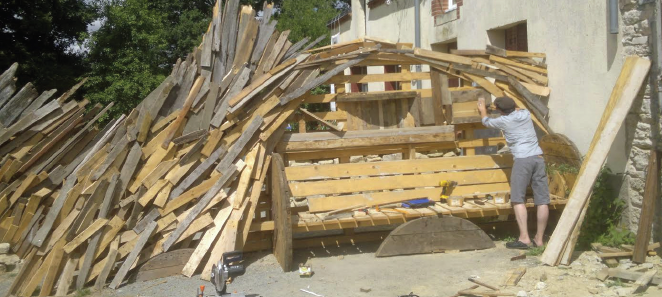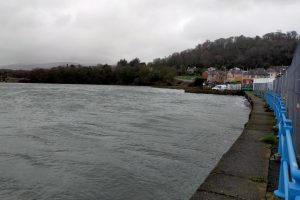 IN AN OCCASIONAL series, The Herald tracks down West Wales people who are living, working and doing extraordinary or even extraordinarily ordinary things abroad.
IN AN OCCASIONAL series, The Herald tracks down West Wales people who are living, working and doing extraordinary or even extraordinarily ordinary things abroad.
For more than seven years, Yoann Le Guen was a popular figure in activist circles in West Wales, always busy organising. Originally from France, Yoann worked as an engineer on renewable energy projects in Wales and more widely. And he certainly brought a lot of energy to local and national groups campaigning on climate change and social justice. Having learned Welsh fluently, Yoann was active in the Climate Camp Cymru mobilisation that saw more than 500 people from all over Wales and beyond joining a protest camp against Ffos y Frân opencast coalmine near Merthyr Tydfil in 2009.
More recently, Yoann was a prime mover in the network Ceredigion Against the Cuts, that organised local actions and buses to take people to national demonstrations. As part of Ceredigion Against the Cuts, he was also involved in supporting campaigns to save Park Avenue Day Centre and Bodlondeb residential home. So, with Ceredigion People’s Assembly in full swing, climate breakdown hard upon us, and various local groups, including Aberaid, taking action to help refugees held in wretched camps in France and elsewhere, where is Yoann when we so badly need his commitment, hard work and skills?
AGAINST THE AIRPORT AND ITS WORLD
The Herald visited Yoann at a remarkable experiment in protest action at an autonomous community set up in the Loire-Atlantique department in western France: La ZAD. The ‘zone à defender’ – the defended area – is an occupation of land to stop the development of a second Nantes airport near the village of Notre- Dame-des-Landes. But it’s become much more than a negative protest, because La ZAD is also saying a resounding yes to a different society with a very different economy. Putting the principles of ‘degrowth’ into practice means living within ecological limits, with open, localised economies and resources more equally distributed through new forms of democratic institution. La ZAD has become a living alternative to the outdated model of development which the airport project represents. For instance, all trade on La ZAD is by donation and there is a weekly free market to distribute any surplus, some of which then goes to homeless people in the nearby city of Nantes. The slogan runs that La ZAD is ‘a struggle against the airport and its world’.
Unlike the case of Heathrow in London, a second international airport near Nantes is not being justified by citing a high volume of air traffic. On the contrary, the proposed airport at Notre-Dame-des-Landes is intended to stimulate economic growth in the region that will, in turn, increase air traffic to increase airport profits. However, Yoann agrees that ‘ for more and more people , the airport seems to be just a way to line the pockets of the bosses of the public works and construction industry’.
The airport plan dates all the way back to the 1970s and opposition to it has been mounting for the last 40 years. Clearly, the logic of the plan is sorely outdated, not least when the impact of the aviation industry on the climate is considered. Nevertheless, lobbied by the developers, Vinci, a mega-corporation which has operations in over 100 countries including the UK, the French authorities seem determined to go ahead and evict the more than 300 people who have settled in La ZAD to fight alongside local farmers and the community. The latest deadline for eviction to hang like a sword of Damocles over La ZAD is October this year. Undaunted, the community of La ZAD, some 60 dwelling places occupied by collectives engaged in a wide variety of activities, continues to build for a future. La ZAD is thoroughly imbued with a never-say-die spirit: “Our first victory is that we defend ourselves despite the fact that nothing enables us to foresee victory. “
As well as numerous horticultural ventures, there are two bakeries on La ZAD, a cheese making enterprise, a mechanical engineering workshop looking after the tractors used both in farming and to obstruct the police, a forge, a pottery, a cinema, a bicycle workshop, a radio station… The list goes on and on. Dear to this Herald reporter’s heart , there is both a weekly newspaper – ZAD News – and a brewery.
CALLING ASTERIX AND OBELIX!
Compulsory purchase of farms on La ZAD has already taken place, though the farmers continue to work the land and most refuse to touch the money deposited in their names by the state. With its long history, the drive behind La ZAD resistance almost predates climate change considerations. At the core of the controversy is land, the farmers working on it and the communities who live there. La ZAD is situated on the almost 5,000 acres of wetland earmarked for airport development. With the water-table less than a metre below the surface, through the winter much of the area is a quagmire and is everywhere scarred by deep tractor ruts. Not, you might think, the ideal land on which to build an airport. Rural life is the heartbeat of the struggle and farmers from all over France stand ready to offer their physical support if the government presses ahead with its plans for eviction and developing the airport. Dating back to 2012 and the government’s last attempt to evict La ZAD, there are over 200 support committees across the length and breadth of France.
In October 2012, the government, directed by then Minster of the Interior, now Prime Minister, Manuel Valls, launched ‘Operation Cesar’ to evict La ZAD by force. Two thousand armed and armoured police spent several weeks trying to accomplish this mission, liberally deploying tear gas and demolishing a dozen dwellings in the process, but a reoccupation attracted 40,000 people and Operation Cesar was finally abandoned and the police withdrew. Many people had been injured, however, thirty seriously, mainly by shrapnel from the ‘flashbang’ grenades used by police. In 2014, a young botanist, Rémi Fraisse, was killed by one of these grenades thrown by police at an occupation against the construction of the Sivens Dam in southern France.
Before most of them return to their homes and jobs, the 40,000 people in La ZAD, running on solidarity and the adrenaline of victory, built a small village to replace the homes that the police had destroyed. Farmers protected the new settlement from police incursion by circling their tractors around it and chaining them together. Yoann points out that Operation Cesar may have been a poor choice of name in the region where the indomitable rebel Gauls Asterix and Obelix regularly defeated and embarrassed the Romans Legions which attempted to occupy their land! On the downside perhaps, La ZAD certainly cannot count the humiliated Manuel Valls among its friends and supporters in the future process of political decisionmaking about the land and its people. The communal feeling on La ZAD is that the Prime Minister may be committed to revenge rather than reason.
The idea of La ZAD has spread, and the philosophy and practices as well as the ‘zad’ prefix has been adopted by other occupations. In France, as elsewhere, the widespread rise of the degrowth movement in various forms is clearly worrying for the political establishment. Bruno Retailleau, a member of the Senate of France who represents the Vendée department, has described La ZAD as ‘this territory lost to the republic’. Indeed, the slogan ‘La ZAD partout!‘ – ‘the ZAD everywhere!‘ – has become a rallying call for protesters and social movement worldwide as well as in France.
We end up discussing the possibilities of a zad in Ceredigion, in the wake of the Brexit referendum result that leaves the county so out of tune with much of the rest of the UK and even Wales, particularly some urban areas. In that vein, Niall Griffiths’ letter in the Guardian (Aug 6) protests against commentators who lump rural Wales together with rural England as ‘the bedrock of the Brexit vote’. With the UK facing an extended period of economic recession, and social unrest already evident, the Ceredigion zad idea didn’t seem so daft to Yoann and myself. Mind you, we had sampled the fine produce of the local brewery. That said, the prospect of making degrowth everyday practice did excite the imagination. La ZAD par tout? It’s worth thinking about, at least.
















Add Comment